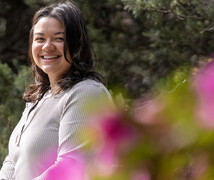Choosing to donate your eggs so a family can have a child is a very special gift. It is also not a decision to be made lightly. If you are considering egg donation, you may have questions. Here, Shelby Neal, MD, a reproductive endocrinologist at the Duke Fertility Center, answers questions commonly asked by egg donors when deciding whether to give this precious gift.
What is the time commitment for donating eggs?
Each egg donation requires two initial screening visits to determine if you meet certain health requirements and if being a donor is right for you. If you become a donor, the process does not begin until a recipient is matched to you.
Once that happens, you will attend about six clinic visits over two weeks. You will also give yourself injections several times a day. You will need to take time off from school or work for the day of the retrieval because sedation is required. You should feel like your normal self within a few days of the retrieval.
How will being an egg donor impact my everyday life?
Outside of the required appointments and taking a day off for egg retrieval, being an egg donor doesn’t impact your ability to go to work or school. We recommend that donors avoid intercourse and high-impact exercise while taking hormone injections.
The injections enlarge the ovaries, and high-impact exercises like running and kickboxing can put you at risk for ovarian torsion. This uncommon condition occurs when the ovaries and fallopian tubes twist and cut off their blood supply.
You can return to your usual activities the day after the retrieval; however, we recommend you continue to abstain from intercourse and high-impact activity for one week as your ovaries recover.
We also tell donors not to consume alcohol during the stimulation cycle leading up to the egg retrieval.
How painful is the process?
The first step in the process involves hormone injections given with a small needle that goes under the skin of the abdomen. Our nurse will teach you how to give these injections to yourself. They are easy to administer, and most people do not report any significant discomfort.
The hormone injections stimulate your ovaries to enlarge and produce eggs. This leads to the production of estrogen in higher levels than your body typically makes, which can cause discomforts such as bloating, fluid retention, and nausea. You may also experience pelvic pain related to the enlargement of the ovaries.
Most people are concerned about pain during egg retrieval. You will receive anesthesia and will be asleep during the procedure, so you will not feel pain. Afterward, some people report pelvic cramping and light bleeding, but significant pain is uncommon. Most people take an over-the-counter pain reliever like ibuprofen to manage the pain and are back to normal in a few days.
What risks are involved with egg retrieval?
The procedure is performed under ultrasound guidance so we can see exactly what we are doing. However, like any surgical procedure, there is a small chance of bleeding and damage to pelvic organs. Antibiotics are given to reduce the risk of infection.
These problems are rare and occur in less than one percent of patients. Research shows there is no link between egg donation and infertility, breast cancer, ovarian cancer, or any other diseases.
Can I still have babies if I donate my eggs?
People have been donating their eggs for more than 20 years, and research shows they are just as likely to be fertile as people who never donated eggs. While it is true that people are born with a finite number of eggs,
it is also true that a limited number are available each month. Only one egg ovulates during a normal monthly cycle. The rest die off and are no longer available. The retrieval process simply takes advantage of the eggs that are not used during the month.
Do I get paid?
You will be compensated $7,500 at your egg retrieval appointment. This payment is made by check and is taxed by the IRS. If the donation is canceled for medical reasons or the recipient cancels the procedure, you’ll receive a portion of the $7,500.
While egg donors receive compensation, financial gain is not the main reason that donors choose this path. Learning what motivates you to become an egg donor is part of the initial screening process.
Why should I go to the Duke Fertility Center instead of an agency?
While agencies may provide higher compensation, it is often required that you fly out of state for doctor visits and stay in a hotel room for several nights to undergo egg retrieval in another city. This is because the clinic selected for egg retrieval will be local to the recipient and not necessarily local to you.
When you donate your eggs at the Duke Fertility Center, the recipients are Duke patients who typically live locally.
Does insurance cover my medical visits and the egg retrieval?
The egg recipient pays for medical insurance to cover exams and medical treatment related to your donation before, during, and for up to three months after the donation.
This insurance cannot be used for unrelated appointments or treatments, but would cover the cost of any complications related to injections or egg retrieval.
Who receives my eggs?
Typically, the recipient of donor eggs is a Duke patient with a history of infertility, meaning they have tried but were unable to build their family through other means.
In some cases, the recipient is postmenopausal or above a certain age and no longer able to use their own eggs.
Occasionally, it is a same-sex male couple that doesn’t have eggs and needs a donor.
Will I be anonymous?
Today, there are many ways for people to learn their biological origin, so no one can be truly anonymous. We don’t introduce recipients and donors because that is typically the preference for both parties.
Sometimes recipients write an anonymous note expressing their gratitude to their egg donor, which we give to the donor on the day of the egg retrieval.
What are the basic requirements to donate at Duke Fertility Center?
There are a few basic requirements to become an egg donor. To become an egg donor, you must:
- Be between the ages 21 and 30
- Reside within 3 hours of the fertility center in Morrisville, NC
- Be a non-smoker
- Maintain a healthy BMI and lifestyle





